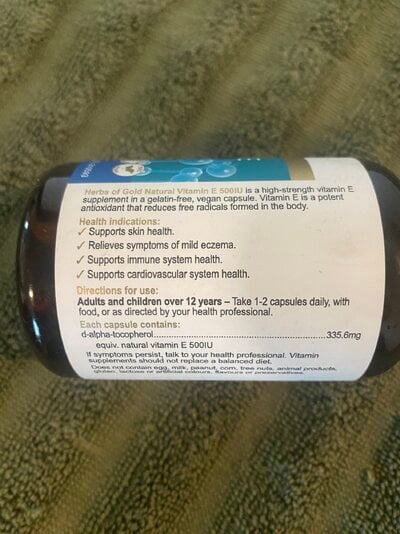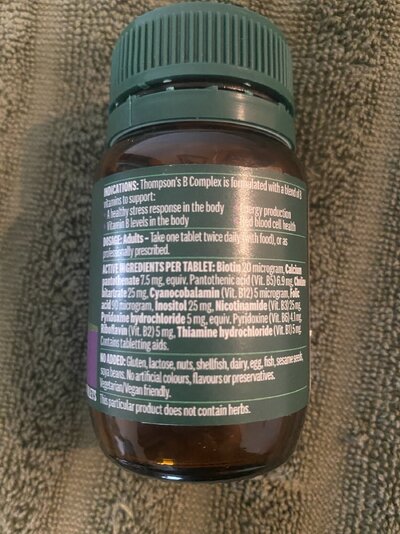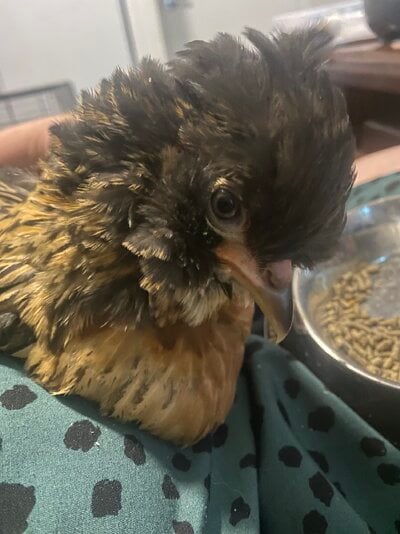justmebee86
Hatching
- Feb 3, 2024
- 1
- 0
- 6
I’ve been treating my 7 week old chick (Unsure of breed-mixed. Hatched from donated eggs) for wry neck for the past 3 weeks with no improvement. I’ve been doing the vitamin E capsule squeezed directly into her beak and b complex method. Started with 1 500IU capsule a day vitamin E for a week and a half along with 1/4 tablet of B complex. No improvement so increased to 2x vitamin E, and 3/4- 1 tablet B complex. I’ve been giving her Tuna and egg daily along with watermelon for hydration and her starter mix which has now moved to grower mix.
She cannot eat and drink on her own. At the start I was giving her water via syringe into her beak. Now she can drink somewhat from a cup if I hold it in front of her whilst she is in my lap whilst one hand holds her in the squatting position with her head on the right angle.
She will eat this way also. When she stands she will tuck her head between her legs.
She can walk small distances but then her head/body starts to shake and she backs up into a corner and is quite distressed. If she does manage to lift her head and stand somewhat straight it’s only for a few moments with her head tilted before she has another “spasm” head goes between the legs and backing into a corner.
I’m starting to wonder if it’s a deeper nurological issue rather than or along side vitamin deficiency. The wry neck came on suddenly. I didn’t observe any obvious head/neck injuries when all this began. She was born fine with no neck/head issues - they developed at 4 weeks. All of the other chicks she hatched with are in perfect health. In saying that none of them really look like her. All the eggs we got from our friend were mixed as they have many different breeds in their flock.
I’m wondering if the roo/hen she came from had something genetically wrong or bad diet/vitamin deficiency. All were fed good quality starter mix with fresh water and a clean and sufficiently heated environment. They had no access to wild birds or other chickens. No mould or known toxins. They were kept in a 2x2 brooder with lots of ventilation on screened and dust extracted breeders choice wood shavings. Healthy chicks were then moved outside at 6 weeks and are growing and doing very well.
What do we think it could be? I’ve never had a chicken with wry neck in the 10 years I’ve been raising them. I will make a vet appointment on Monday Is there anything specific I should get them to test? Should I push for antibiotics incase it’s something bacterial?
I did think possible Marek’s disease but she has no paralysis/weakness in her legs or wings and no obvious lesions near eyes or on the body.
Video 1 is of her spasm. I was cleaning out her cage when she backed on to the brick that usually has her elevated dish of food and water. Pink stains on brick are from a strawberry. NOT blood. Video 2 is of me holding her so she can eat. Photos are of the vitamins I’ve been using.
Video 1 -
Video 2 -
Thank you from Australia
She cannot eat and drink on her own. At the start I was giving her water via syringe into her beak. Now she can drink somewhat from a cup if I hold it in front of her whilst she is in my lap whilst one hand holds her in the squatting position with her head on the right angle.
She will eat this way also. When she stands she will tuck her head between her legs.
She can walk small distances but then her head/body starts to shake and she backs up into a corner and is quite distressed. If she does manage to lift her head and stand somewhat straight it’s only for a few moments with her head tilted before she has another “spasm” head goes between the legs and backing into a corner.
I’m starting to wonder if it’s a deeper nurological issue rather than or along side vitamin deficiency. The wry neck came on suddenly. I didn’t observe any obvious head/neck injuries when all this began. She was born fine with no neck/head issues - they developed at 4 weeks. All of the other chicks she hatched with are in perfect health. In saying that none of them really look like her. All the eggs we got from our friend were mixed as they have many different breeds in their flock.
I’m wondering if the roo/hen she came from had something genetically wrong or bad diet/vitamin deficiency. All were fed good quality starter mix with fresh water and a clean and sufficiently heated environment. They had no access to wild birds or other chickens. No mould or known toxins. They were kept in a 2x2 brooder with lots of ventilation on screened and dust extracted breeders choice wood shavings. Healthy chicks were then moved outside at 6 weeks and are growing and doing very well.
What do we think it could be? I’ve never had a chicken with wry neck in the 10 years I’ve been raising them. I will make a vet appointment on Monday Is there anything specific I should get them to test? Should I push for antibiotics incase it’s something bacterial?
I did think possible Marek’s disease but she has no paralysis/weakness in her legs or wings and no obvious lesions near eyes or on the body.
Video 1 is of her spasm. I was cleaning out her cage when she backed on to the brick that usually has her elevated dish of food and water. Pink stains on brick are from a strawberry. NOT blood. Video 2 is of me holding her so she can eat. Photos are of the vitamins I’ve been using.
Video 1 -
Video 2 -
Thank you from Australia
Attachments
Last edited:








